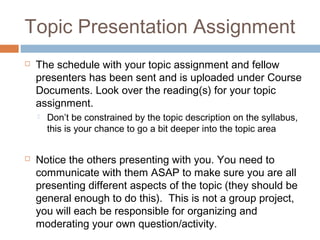
Behaviorism tocognitivism 13
- 1. Topic Presentation Assignment The schedule with your topic assignment and fellow presenters has been sent and is uploaded under Course Documents. Look over the reading(s) for your topic assignment. Don’t be constrained by the topic description on the syllabus, this is your chance to go a bit deeper into the topic area Notice the others presenting with you. You need to communicate with them ASAP to make sure you are all presenting different aspects of the topic (they should be general enough to do this). This is not a group project, you will each be responsible for organizing and moderating your own question/activity.
- 2. Topic Presentation Assignment The purpose of having you do the presentations is to get another perspective on the chosen topic so here is what you need to do to prepare a great presentation: Find AT LEAST two outside (peer-reviewed) readings on the topic. Ideally these readings will describe empirical studies or be a research review centered on your topic area. The best place to start is by examining the reference lists or citations from the assigned readings. Summarize your readings (a concise executive summary will do-- synthesis is a good thing) and construct a discussion question/activity for the weekly forum. Feel free to use any media, links and/or examples to illustrate your points. Make sure to post your threads in the designated discussion forum and moderate the discussion throughout the week to answer questions and/or clarify. Finally, when we meet the following week, I will ask you to recap the discussion in the beginning of class. If you can't make the class, you will need to send me a summary of the discussion.
- 3. HISTORICAL OVERVIEW: FROM BEHAVIORISM TO COGNITIVISM IDT 760/860
- 4. The theory of behaviorism Grew out of associationism Association and reassociation of observed elements S-R accounted for many observable phenomena Classical conditioning A means to shape behavior Primarily studied in animals (assuming generalization) Assumption Reactions are learned through positive or negative responses to stimulus
- 5. Behaviorism and Learning John Watson Nuture over nature Thorndike Cats and puzzle boxes Stimulus-reward evokes desired behavior Skinner Operant conditioning-added reinforcement to the mix The subjectivity problem
- 6. Issues with Behaviorism Some organisms demonstrated possible mental models Rats learning mazes and adapting to change Could not be explained as simple stimulus- response Language development Are we hard-wired? What about the Black Box?
- 7. What is cognitive psychology? Focuses on the representation and processing of knowledge Keywords: representation and processing Understanding human perception or thought and memory These ideas are not very old
- 8. The cognitive revolution Defining cognition Disenchantment with behaviorist findings Generalization of findings across species was difficult Experiments with confusing results Breland’s pigs Causes: WWII and human performance Computer metaphor And, the debate over language
- 9. Fuzzy starting point Miller’s (1956) Magic Number Bruner (1956) and Ausubel’s (1960) focus on mental structures Founding of the Center for Cognitive Studies at Harvard (1960) Niesser’s (1967) Co g nitive Ps y c ho lo g y Minsky (1975) and frames Schemata and scripts (mid to late 70s)
- 10. Assumptions Mental processes exist Mental processes can be studied scientifically Humans are active information processors Shift from learning to learners
- 11. Studying cognitive processes Because these are internal processes they are harder to measure Reaction time More time = greater processing Error rates Gives insight into cognitive processing of information Relationship between these two
- 12. More Methods Accuracy Introspection or “think aloud protocol” Motor movement Eye movements EEG Evoked Potentials (Event Related Potentials) Measurement of electrical activity in the brain P300 is thought to be the marker for cognitive processes
- 14. Defining the science From “A Companion to Cognitive Science” (1998) Cognitive Science is the multidisciplinary scientific study of cognition and its role in intelligent agency. It examines what cognition is, what it does and how it works. From the Cognitive Science Society website (http://cognitivesciencesociety.org/index.html) “…researchers from many fields who hold a common goal: understanding the nature of the human mind”
- 15. Who is represented? Disciplines include: Psychology Philosophy Anthropology Education AI Linguistics
- 16. First driving force The field of artificial intelligence Forced researchers to apply workings of human mind to computer programming Mental representations Propositions Rules, concepts, images, analogies, etc. Mental procedures Providing a theoretical base for cognitive psychology
- 17. Assumptions in Cognitive Science People have… mental representations lead to deductive and inductive processes mental rules and procedures for searching these rules a set of organized concepts and procedures for retrieving concepts verbal and visual representations that can be used as cases or analogs visual images of situations and processes for retrieving those images Representations that involve processing units linked by connections
- 18. Critiques of Cognitive Science No Accounting for Emotion ◦ This is being addressed ◦ http://emotion.autotutor.org/ Consciousness ◦ Human thinking includes consciousness Physical world, social cognition ◦ Contributions of the human body and social systems to learning Dynamical systems, mathematics challenge ◦ Some feel the mind is a dynamical system and not bound to computational constraints
- 19. Where does ID fit in? If the purpose of the science is to understand the workings of the human mind, educators are the best consultants Keeps the field of cognitive science grounded in reality ◦ Practical applications for underlying theory We can learn from them…they can learn from us
- 20. Changes in Next Week Please finish Chapter 3 of Martinez before next week (from page 50 on by Jan 29) I am making some adjustments to the reading list for the weeks of: Feb 5 March 5 These adjustments will come to you via Blackboard email
